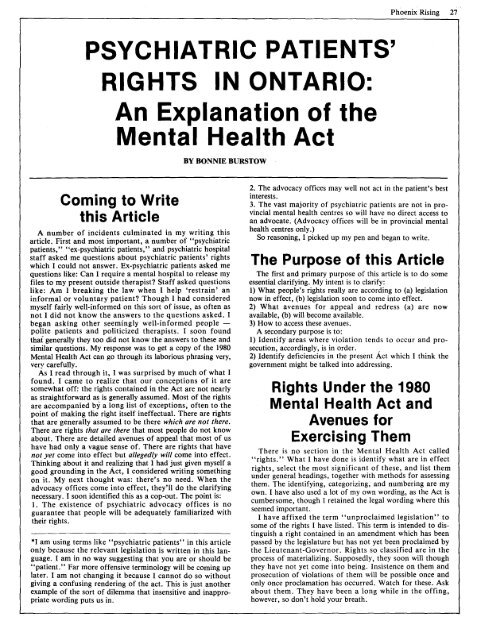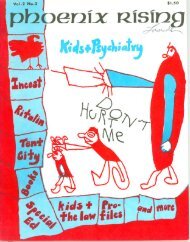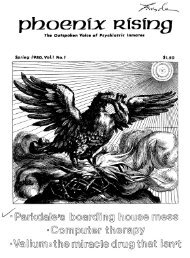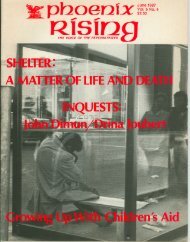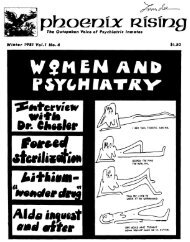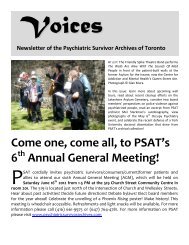Vol. 4 No.1 - Psychiatric Survivor Archives of Toronto
Vol. 4 No.1 - Psychiatric Survivor Archives of Toronto
Vol. 4 No.1 - Psychiatric Survivor Archives of Toronto
Create successful ePaper yourself
Turn your PDF publications into a flip-book with our unique Google optimized e-Paper software.
Phoenix Rising 27PSYCHIATRIC PATIENTS'RIGHTS IN ONTARIO:An Explanation <strong>of</strong> theMental Health ActBY BONNIEBURSTOWComing to Writethis ArticleA number <strong>of</strong> incidents culminated in my writing thisarticle. First and most important, a number <strong>of</strong> "psychiatricpatients," "ex-psychiatric patients," and psychiatric hospitalstaff asked me questions about psychiatric patients' rightswhich I could not answer. Ex-psychiatric patients asked mequestions like: Can I require a mental hospital to release myfiles to my present outside therapist? Staff asked questionslike: Am I breaking the law when I help 'restrain' aninformal or voluntary patient? Though I had consideredmyself fairly well-informed on this sort <strong>of</strong> issue, as <strong>of</strong>ten asnot I did not know the answers to the questions asked. Ibegan asking other seemingly well-informed people polite patients and politicized therapists. I soon foundthai generally they too did not know the answers to these andsimilar questions. My response was to get a copy <strong>of</strong> the 1980Mental Health Act can go through its laborious phrasing very,very carefully.As I read through it, I was surprised by much <strong>of</strong> what Ifound. I came to realize that our conceptions <strong>of</strong> it aresomewhat <strong>of</strong>f: the rights contained in the Act are not nearlyas straightforward as is generally assumed. Most <strong>of</strong> the rightsare accompanied by a long list <strong>of</strong> exceptions, <strong>of</strong>ten to thepoint <strong>of</strong> making die right itself ineffectual. There are rightsthat are generally assumed to be there which are not there.There are rights that are there that most people do not knowabout. There are detailed avenues <strong>of</strong> appeal that most <strong>of</strong> ushave had only a vague sense <strong>of</strong>. There are rights that havenot yet come into effect but allegedly will come into effect.Thinking about it and realizing that I had just given myself agood grounding in the Act, I considered writing somethingon it. My next thought was: there's no need. When theadvocacy <strong>of</strong>fices come into effect, they'll do the clarifyingnecessary. I soon identified this as a cop-out. The point is:1. The existence <strong>of</strong> psychiatric advocacy <strong>of</strong>fices is noguarantee that people will be adequately familiarized withtheir rights.*1 am using terms like "psychiatric patients" in this articleonly because the relevant legislation is written in this language.I am in no way suggesting that you are or should be"patient." Far more <strong>of</strong>fensive terminology will be coming uplater. I am not changing it because I cannot do so withoutgiving a confusing rendering <strong>of</strong> the act. This is just anotherexample <strong>of</strong> the sort <strong>of</strong> dilemma that insensitive and inappropriatewording puts us in.2. The advocacy <strong>of</strong>fices may well not act in the patient's bestinterests.3. The vast majority <strong>of</strong> psychiatric patients are not in provincialmental health centres so will have no direct access toan advocate. (Advocacy <strong>of</strong>fices will be in provincial mentalhealth centres only.)So reasoning, I picked up my pen and began to write.The Purpose<strong>of</strong> this ArticleThe first and primary purpose <strong>of</strong> this article is to do someessential clarifying. My intent is to clarify:1) What people's rights really are according to (a) legislationnow in effect, (b) legislation soon to come into effect.2) What avenues for appeal and redress (a) are nowavailable, (b) will become available.3) How to access these avenues.A secondary purpose is to:1) Identify areas where violation tends to occur and prosecution,accordingly, is in order.2) Identify deficiencies in the present Act which I think thegovernment might be talked into addressing.Rights Under the 1980Mental Health Act andAvenues forExercisingThemThere is no section in the Mental Health Act called"rights." What I have done is identify what are in effectrights, select the most significant <strong>of</strong> these, and list themunder general headings, together with methods for assessingthem. The identifying, categorizing, and numbering are myown. I have also used a lot <strong>of</strong> my own wording, as the Act iscumbersome, though I retained the legal wording where thisseemed important.I have affixed the term "unproclaimed legislation" tosome <strong>of</strong> the rights I have listed. This term is intended to distinguisha right contained in an amendment which has beenpassed by the legislature but has not yet been proclaimed bythe Lieutenant-Governor. Rights so classified are in theprocess <strong>of</strong> materializing. Supposedly, they soon will thoughthey have not yet come into being. Insistence on them andprosecution <strong>of</strong> violations <strong>of</strong> them will be possible once andonly once proclamation has occurred. Watch for these. Askabout them. They have been a long while in the <strong>of</strong>fing,however, so don't hold your breath.


